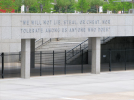- Joined
- May 22, 2018
- Messages
- 5,502
The military is not a business — at least not in the traditional sense of delivering a profit to shareholders. Therefore, a traditional ROI calculation is not only irrelevant but also misleading.
Typical ROI calculations compare apples to apples, i.e. a dollar invested yields an incremental dollar downstream. But the military — specifically officer development and officer output — cannot be measured so simply. Looking solely at years served is a woefully inadequate measuring stick.
Of course, as a taxpayer, I want the military to spend its funds wisely and prudently. No more $900 ashtrays in transport planes (or whatever it was). But it’s always interesting to see sticklers use episodes such as this to justify their so-called reformist agenda.
In the end, the military isn’t trying to maximize yield 10 or 20 years downstream. It is, however, trying to optimize that yield. The goal is not to ensure that a lot of officers make flag rank, but to make sure it’s the best ones that do. The military is, after all, not meant to be a lifetime employment plan. And neither are corporations — at least at the senior management level.
Typical ROI calculations compare apples to apples, i.e. a dollar invested yields an incremental dollar downstream. But the military — specifically officer development and officer output — cannot be measured so simply. Looking solely at years served is a woefully inadequate measuring stick.
Of course, as a taxpayer, I want the military to spend its funds wisely and prudently. No more $900 ashtrays in transport planes (or whatever it was). But it’s always interesting to see sticklers use episodes such as this to justify their so-called reformist agenda.
In the end, the military isn’t trying to maximize yield 10 or 20 years downstream. It is, however, trying to optimize that yield. The goal is not to ensure that a lot of officers make flag rank, but to make sure it’s the best ones that do. The military is, after all, not meant to be a lifetime employment plan. And neither are corporations — at least at the senior management level.

